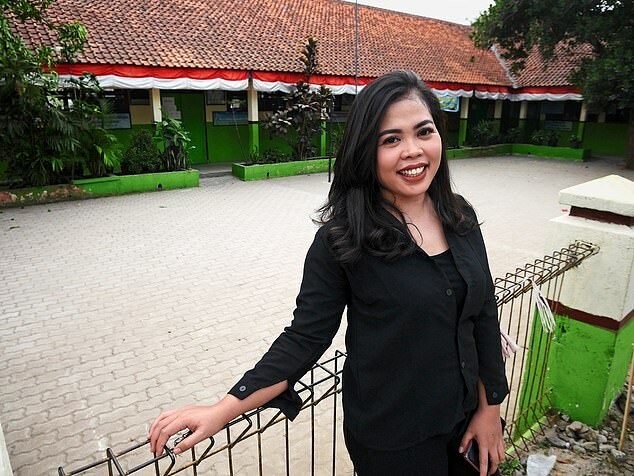Young mother fooled into smearing playboy with a deadly nerve agent in ‘prank’ that she thought would make her a YouTube star is tracked down to the remote village
They were words Siti Aisyah had long dreamed of hearing, spoken by the filmmaker who had plucked this naive farmer’s daughter from obscurity in order to make her a star. ‘If today goes well you will be known all around the world,’ he told her. ‘You can become a famous actress.’
In some ways the filmmaker was right: Siti did indeed become world famous – but not for the reasons she expected.
Instead, her name is now synonymous with one of the world’s most audacious murders, the assassination of North Korean tyrant Kim Jong Un’s playboy brother Kim Jong Nam. He died in agony in February 2017 after being smeared with the deadly nerve agent VX at Kuala Lumpur international airport.
He had been killed in broad daylight – by two young women who maintain they believed they were taking part in nothing more than a simple prank for the video sharing site YouTube.
Despite their protestations of innocence, Siti and her fellow ‘actress’, Duong Thi Huong, faced the very real prospect of the death penalty and spent more than two years in prison – much of it in solitary confinement – before they were dramatically released earlier this year when the murder charges against them were unexpectedly dropped.
Ever since, Siti has determinedly kept a low profile, returning to her remote home village in rural Indonesia to try to pick up the pieces of her life. Only now, tracked down by The Mail on Sunday, has she decided to tell her extraordinary story in full for the first time.
In turns remorseful, angry and bewildered, Siti describes how it feels to have been so ruthlessly exploited by killers who did not care if she too would live or die. Indeed, it is only by fluke that she didn’t succumb to the deadly poison herself.
‘I had no idea what I had done,’ Siti says, fighting back tears. ‘They told me they were going to make me a star. I feel so foolish for believing them so easily. I didn’t know who Kim Jong Un was before all of this. I didn’t even know where North Korea was. I feel bad about what happened to Kim Jong Nam and I wish I had never been involved. If I could turn back time, I would never have agreed to do any of it.
‘When I got out of prison I looked up my name on the internet and finally realised what it had all been about. I thought, ‘How can I have been caught up in such a big murder case involving these important people?’ I am just a girl from a small village. I just believed I was playing pranks. That’s all I ever thought.’
Certainly few could deny that Siti makes the most unlikely of assassins. Tiny and looking much younger than her 27 years, it is hard to believe she is the mother of a ten-year-old boy, Rio, who was just seven when she was imprisoned.
Her story reads like something out of a far-fetched paperback thriller: a beautiful young woman is recruited by secret agents to fulfil a deadly and clandestine mission. Her excuse – that she didn’t know anything about the murder plot – is even more outlandish. Yet meeting her in the modest home she shares with her devout Muslim parents in an impoverished village goes some way to explaining that. Their simple one-storey house is down a dirt track flanked with coconut and mangrove trees and the living room wall is decorated with treasured family photographs and verses from the Koran.
Siti’s interest and knowledge of the wider world is sketchy at best: she couldn’t tell you, for example, who Donald Trump is.
The youngest of three children, she left school at 12 and, by 17, was married with a son. ‘I was only happy for the first three months. I soon found out my husband liked gambling and women and never supported me financially,’ she says.
The marriage broke down and she left her son in the care of her parents-in-law to become one of thousands lured into making a living in the sex industry in the Malaysian capital Kuala Lumpur.
By 2017 she was working as a masseuse in the city’s Flamingo hotel, and picking up night-time clients at the sleazy Beach Club Cafe where, in the small hours of a January morning, she had an encounter with a taxi driver which would change the course of her life for ever. ‘He told me he had a Japanese client who was looking for someone to act in a reality TV show and he said I had just the right look,’ she recalls.
Flattered, Siti went to a meeting in an upmarket shopping mall the next day where she met ‘James’, who told her he was a Japanese TV producer making Candid Camera-style shows for YouTube.
In fact, James – real name Ri Ji U – was a 30-year-old North Korean agent. Unable to speak Indonesian, he communicated via Google Translate. Siti’s first ‘job’ was straightforward enough, if a little odd – and at £80, the pay was lucrative: she merely had to approach three men at random in the local mall and smear baby oil on them before apologising and walking away while James filmed it on his iPhone.
‘Afterwards he told me I had done a good job and there would be more work like this for me,’ she recalls.
‘I was nervous about doing the pranks at first in case someone reacted badly or hit out but I was very happy to have the work. I questioned why anyone would want to watch this sort of thing but they told me Japanese audiences loved it and the videos were being edited in Singapore for a big TV show.
‘I had earned 400 ringgits (£80) for 15 minutes’ work. In the hotel where I worked as a masseuse I only earned 20 ringgits (£4) for each customer.’
In the following weeks, Siti was summoned by James to carry out similar pranks in other malls and at Kuala Lumpur airport.
The drill was always the same: James would put lotion on Siti’s hands before she approached her bemused victims from behind and wiped her hands on their face.
Then, after a quick apology, she would make a swift exit and pocket a payment – now increased to £100 – for each successfully completed ‘prank’. Never once, she says, did she question the nature of her new work – which she now knows was, in reality, training for just one single murderous mission. ‘James told me he would take me to America,’ she recalls. ‘I even gave him my passport so he could arrange visas for me. I was very excited. I thought this was going to change my life and I would be able to leave my old life behind.’
Siti admits she was developing feelings for James – and that may well have made it easier for her to dispel any lingering misgivings.
‘I liked him because he was handsome, but he was shy around women,’ she says. Their friendship did not last: within weeks Siti was flown to Cambodia and linked with another ‘producer’ called Mr Chang – in reality another Korean handler by the name of Hong Song Hac.
Mr Chang spoke fluent Bahasa, Siti’s mother tongue, but she says: ‘I didn’t like him. When he got serious, I was a little bit afraid of him.’
The work was the same however, and Siti continued to film pranks for money in both Phnom Penh and Kuala Lumpur. Behind the scenes, the North Koreans were desperately trying to track Kim Jong Nam – who was constantly on the move – in order to carry out their deadly plan. The only credible rival to his brother, they had long fallen out and for years he had been a dead man walking as the regime suspected he was passing secrets to the US.
As the North Koreans closed in on their target, they tracked him as he returned to Malaysia where, police sources confirmed to The Mail on Sunday, he met a CIA agent and exchanged a laptop full of data for a wad of $100 bills. Two days before the assassination Siti, now back in Kuala Lumpur, recalls being given a $200 bonus by Mr Chang. ‘When I asked what the money was for, he said it was because I worked very well in Phnom Penh and his boss was very happy with me.’
She was told her next job could propel her to international stardom. ‘I didn’t think I was going to be famous,’ she insists. ‘I liked the money.’
It’s clear that she was flattered, though, and was convinced enough to tell her friends at a 25th birthday party at Jakarta’s Hard Rock cafe the following night. In what proved to be an eerily prescient clip, captured on her mobile phone, one of Siti’s friends boasts that ‘Siti is going to be a celebrity.’ Little could they imagine the reason why.
The following day Siti arrived at a Kuala Lumpur airport coffee shop to meet ‘Mr Chang’ for a briefing on her latest prank. He told her this one would be slightly different: not only did he have a particular target in mind but Siti would carry it out with another ‘actress’ who at the last moment would approach him from another direction.
As with every previous prank, the ‘filmmaker’ then took out a small container, the size of a hotel shampoo bottle and poured liquid on to Siti’s hands, pointed out her target in the busy airport departure lounge, and sent her off in his direction. ‘Mr Chang told me the man was a big boss in his company,’ she says. ‘He said he was very arrogant and might get angry so I should carry out the prank and then get away as quickly as I could.’
It’s one reason Siti admits she was unusually nervous as she walked towards the man she now knows was Kim Jong Nam.
She recalls being just two steps away from him when her accomplice Huong suddenly cut across her path from a different direction and placed her hands over his eyes. ‘He looked annoyed and upset,’ Siti says. ‘I thought, ‘He looks like a rich man and he is clearly angry and he might report us to the police.’ ‘
Initially, intelligence officials thought that each woman may have been carrying different chemical components which, though harmless on their own, would create a deadly compound when mixed together.
In fact, both women were carrying the lethal VX poison on their hands and were very nearly killed themselves in the process.
Siti and Huong fled in different directions after the attack and both went straight to different washrooms to clean the sticky liquid off their hands – an act that would almost certainly save their lives.
Just yards away Kim Jong Nam was writhing in agony on the concourse floor, his vital organs shutting down one by one.
It would later emerge that Kim Jong Nam was carrying an antidote to VX in his backpack but in the grip of blinding pain had not thought to use it. After approaching airport officials he was taken to a clinic and died in an ambulance on the way to hospital.
Oblivious to the unfolding horror, Siti would then spend three hours ambling around the airport’s shopping mall, buying clothes and having lunch before returning to the city’s Flamingo hotel where she worked as a masseuse between filming assignments.
So unaware was Siti of the international drama that when, two nights later, police arrived to arrest her, she initially thought it was another YouTube prank. ‘They said, ‘Where were you on the 13th? Were you at the airport?’ I said yes, I was shooting a video. They asked why I didn’t ask for permission and said, ‘Come with us to the police station.’ I thought it was just a random police check on foreign workers.
‘Then at the police station they told me I had been involved in the murder of a president’s brother. I just laughed and said ‘You must be joking’ and asked them to give me my passport and my phone and let me go home. But they got angry with me and put me in handcuffs.’
Siti was taken to hospital, where traces of VX were found on the top she was wearing at the airport.
It was a fortnight before she was allowed to see a lawyer ahead of her first court appearance where she was charged with murder – a crime which in Malaysia carries a mandatory death penalty.
‘I was absolutely terrified when I realised I might be executed,’ Siti says, her eyes once more filling with tears. ‘I was so confused. How could I be in this situation? I cried every day for three months. I couldn’t eat and I couldn’t drink. I thought I’d never see my son again.’
With a forthcoming trial hanging over her, Siti spent the first year of her imprisonment in solitary confinement, her only company aside from legal and embassy visits the prison guards who watched her room and mercilessly taunted her.
‘They asked me if I wanted to commit suicide because it was such a big case that I was involved in. Another time one of them told me that if I didn’t plead guilty, North Korea would bomb my home country, Indonesia,’ she says. Her only contact with her parents meanwhile was a weekly 15-minute phone call.
‘The first time I called them I just cried,’ she says. ‘Even now my parents have never asked me about the case. They’ve seen it on the TV news, so they know what it was about, but they don’t want to think about what I’ve been through.’
After several months of agonising delays, Siti’s trial was set to begin in March. Then in another dramatic development the murder case was dropped. No reason was given, with Malaysian prime minister Mahathir Mohamad insisting there had been no negotiations but that the decision had merely been in line with ‘the rule of law’.
Her charge was reduced to ‘administering a poison’, a crime for which she had already served the necessary jail time.
Siti’s lawyer Gooi Soon Seg told The Mail on Sunday that the real killers must be brought to justice. ‘It was a brilliant plot when you think about it. The plan was for Kim Jong Nam to walk straight on to his flight [unaware he’d been poisoned] and die on the plane. It would have been classified as a heart attack and everything would have gone unnoticed.
‘They brought VX into the country – that is tantamount to a declaration of war,’ he says. ‘The people who planned this murder should absolutely be brought to justice.’
It’s perhaps a final irony that her own role in this political killing helped Siti to achieve the celebrity she craved: treated like a VIP upon her release, she was flown home by private jet and taken straight to see the Indonesian president. For two months she was guarded in a safe house until the security risk was reduced.
There are more tears when Siti recalls how, during her absence, her son Rio had grown so tall that at their emotional reunion she could no longer scoop him up into her arms as she used to. ‘We had been apart for more than two years. I told him I was so sorry, and I hadn’t been able to contact him while I was in prison. He didn’t answer. He just smiled and hugged me tightly.’
She adds: ‘I have to accept that I was gullible. I am angry and upset with James and Mr Chang because I told them so many personal things and confided in them – then they put me in this terrible situation where they didn’t care if I lived or died.’
Today, six months on, she is studying to become a beautician and claims to want to put her notoriety behind her. ‘I want a better future’ she insists. ‘I want to have more children and maybe someday I will marry again if I find a good man.’
Nonetheless, she still seems strangely seduced by the fame that found her in the deadliest of circumstances. ‘Who would imagine that someone like me, who only went to primary school, could become world famous?’




